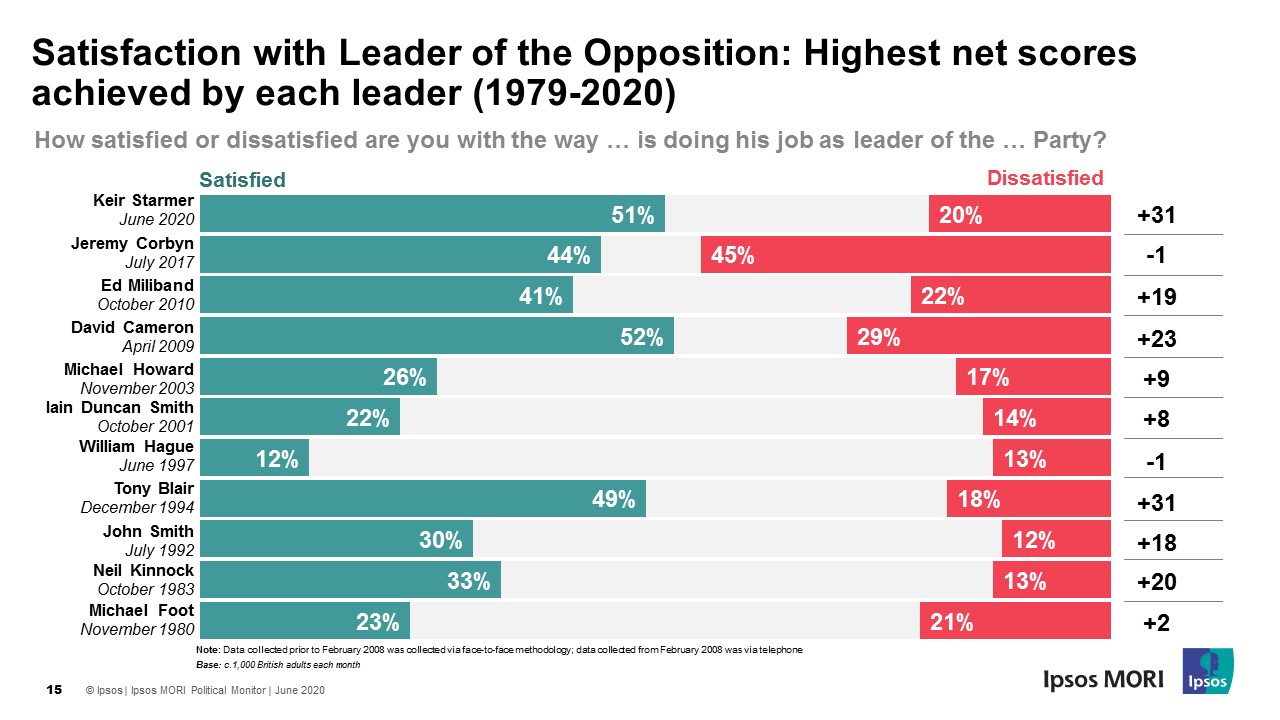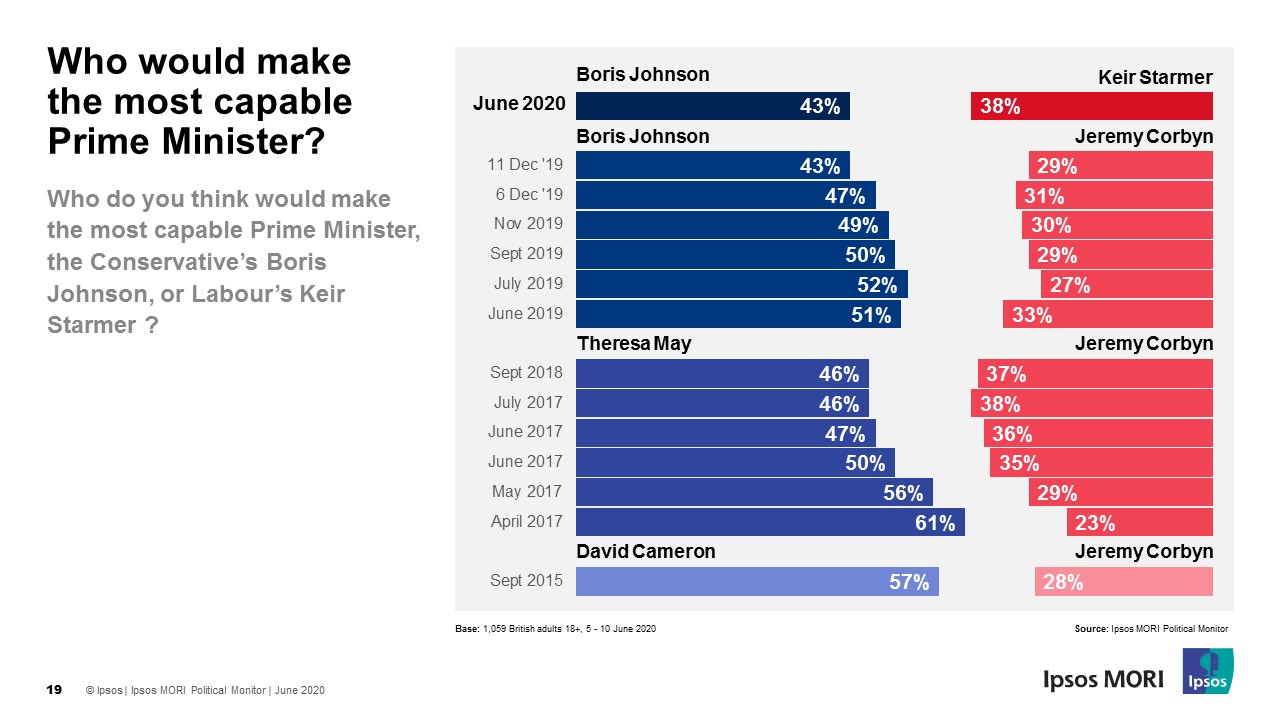Starmer achieves best satisfaction ratings for a Leader of the Opposition since Blair
Keir Starmer's new net satisfaction score (+31) is the highest score achieved by an Opposition leader since Tony Blair in the mid-nineties.
Two months into his role as leader of the opposition, Labour leader Keir Starmer is achieving satisfaction ratings comparable to Tony Blair and David Cameron – both of whom went on to reach Number 10 from opposition. However, Boris Johnson is still narrowly seen as a more capable PM and the Conservatives maintain a slender poll lead over Labour, although after a fall from the last Ipsos political monitor taken pre-lockdown in March, before Starmer became Labour leader.
Keir Starmer vs past Leaders of the Opposition
- 51% of Britons are satisfied with the Labour leader, 20% dissatisfied. 29% don’t know. 77% of Labour voters are satisfied with him.
- Starmer’s overall ‘net satisfaction score’ of +31 matches the best score achieved by Tony Blair in opposition of +31 in December 1994 and +30 in March 1995.
- David Cameron’s best net satisfaction score (+23) was achieved in April 2009, a similar number of Britons indicated satisfaction with Cameron then (52%) compared to Starmer now but more were dissatisfied with Cameron (29%) at the time and fewer said don’t know (19%).
- The best net ratings for Labour or Conservative opposition leaders who did not go on to be Prime Minister tended to come at the beginning of their tenure when they were less well known. The exception is Jeremy Corbyn, who achieved his best rating as Labour leader just after the 2017 General Election. Note – in the chart below gaps between satisfied and dissatisfied figures mean don’t know.

Boris Johnson and the government
- 48% (-4) are satisfied with the way Johnson is doing his job as PM, 49% (+11) dissatisfied. 4% (-5) don’t know.
- Johnson’s net rating of -1 is much better than those achieved by John Major (-56) and Gordon Brown (-28) at the time Blair and Cameron achieved their best net satisfaction ratings in the chart above.
- Johnson’s net rating of -1 has fallen since March when he scored +14 as the coronavirus crisis started to hit but it is close to his score of +3 that he achieved in February.
- 40% are satisfied with the way the government is running the country (-8) and 51% are dissatisfied (+10). 8% don’t know (-2).
- The government’s net rating is down from +7 in March to -11 now and closely matches the -10 score achieved in February.
Most capable PM
- When asked to choose 43% of Britons say Boris Johnson would make the most capable PM and 38% say Keir Starmer. 19% say neither or don’t know.
- 9% of current Labour voters say Johnson would make the most capable PM but only 2% of Conservative voters say the same about Starmer.
- At the December 2019, General Election 43% said Johnson would make the most capable PM and 29% said Jeremy Corbyn.

Voting intention
- The Conservatives lead Labour by 5 points in terms of voting intention down from 22 points in mid-March. The Conservatives are on 43% (-9), Labour are on 38% (+8), Lib Dems 10% (+1), SNP 4% (-1) and Greens 3% (-1).
Some other findings from the political monitor include:
- In terms of economic optimism, 22% expect the economy to improve in the next 12 months (+7 from March), 69% say it will get worse (no change) and 6% say it will stay the same (-7). 3% don’t know (no change).
- The Ipsos economic optimism score of -47 is up 7 points from just before lockdown in March -54. However, the proportion of Britons saying the economy will get worse is still the joint highest score since September 2008.
- 40% think the government has handled coronavirus well (-9 from March) and 44% badly (+9).
- 45% think Boris Johnson has handled the crisis well (-2) and 42% badly (+4). 42% think Matt Hancock has handled the crisis well (+3) and 37% badly (+14).
- However, some 60% think the Chancellor Rishi Sunak has handled coronavirus well (+19) and just 14% say badly (+1). This includes a majority (54%) of Labour voters.
- 58% say CMO Chris Whitty has handled the virus well (+6) and just 16% say badly (+2).
Commenting on the findings, Gideon Skinner, Head of Political Research at Ipsos, said:
Labour will of course be encouraged that Keir Starmer is achieving comparable leader satisfaction ratings to Tony Blair and David Cameron when they led the opposition, as both went on to become General Election winners. However this is still very early days – it’s not unusual to see a honeymoon period for a new leader. And there is an important difference – Boris Johnson is still more popular than John Major and Gordon Brown were when Blair and Cameron achieved their best scores. With concerns about the economy and the coronavirus high, how the two leaders handle these over the next few months will be crucial.






